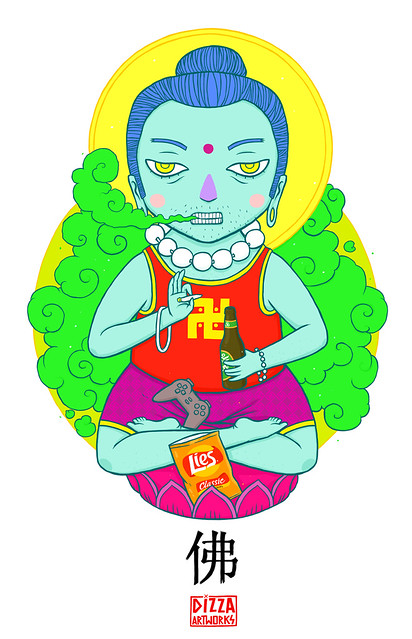
- desire
- detestation
- delusion
- dread
 In ancient India, critics "reviled the noble ones" much to their detriment -- because the weight of our karma is determined not only by what we do and what intention initiates it, but whom we do it to. Harming those who commit no intentional harm, stealing from those who do not steal, getting angry at those who do not get angry (such as arhats and buddhas)... it cannot come to a good end for the person who undertakes and carries out such a deed (karma). Picking up this thread and taking the idea back from India, St. Issa is reputed to have said: "You reap what you sow."
In ancient India, critics "reviled the noble ones" much to their detriment -- because the weight of our karma is determined not only by what we do and what intention initiates it, but whom we do it to. Harming those who commit no intentional harm, stealing from those who do not steal, getting angry at those who do not get angry (such as arhats and buddhas)... it cannot come to a good end for the person who undertakes and carries out such a deed (karma). Picking up this thread and taking the idea back from India, St. Issa is reputed to have said: "You reap what you sow."
Does the Buddha ever get angry or experience aversion (dosa)? No. It seems like he does sometimes -- when, for example, he sounds annoyed or weary or is exhorting. But a fully enlightened individual has cut off the three poisons of the heart/mind at the root, and they can never arise again. Habits, ways of speaking, or mannerisms can persist, but not the intentions behind them that makes our unskillful actions detrimental karma.
In the Face of Blame and Praise
The Long Discourses of the Buddha (DN 1)  On one occasion two spiritual wanderers were following behind discussing the Buddha. One was full of anger and criticism, the other full of admiration and praise. When the Buddha was apprised of it, he neither became upset nor elated.
On one occasion two spiritual wanderers were following behind discussing the Buddha. One was full of anger and criticism, the other full of admiration and praise. When the Buddha was apprised of it, he neither became upset nor elated.
When asked why, he explained that the anger of the first was unjustified. And that if he himself should become angry in return, it would only be harming himself. Anger falls back on one to one's own detriment.
Knowing the mind of the other as well, he explained that the praise was not for what was indeed praiseworthy about the Buddha but rather what that young wanderer regarded as important (the Buddha's moral virtues). If he became elated at such flattery, it would only be a hindrance to himself.
He then exhorted his followers: If there is criticism of me, the Dharma, or the Sangha (the Order), how would you react? Neither give rise to anger nor elation, but rather hear out those who criticize or praise. If one were to give rise to anger or elation, one's mind would become unclear. And one would not be able to determine the validity of what was being said.
Compiled and translated by Ven. S. Dhammika (The Wheel No. 342/344)
Oneself and Others (Attaparavagga)
136. All tremble at punishment.
Life is dear to all.
Put yourself in the place of others;
kill none nor have anyone killed.
137. By doing evil, one defiles oneself;
by avoiding evil, one purifies oneself.
Purity and impurity depend on oneself:
No one can purify another.
138. Let no one neglect one's own welfare
for the welfare of others however much.
Clearly understanding one's own welfare
strive always for one's own true good.
139. One should first establish oneself
in what is proper and only then
try to instruct others. Doing this,
the wise one will not be criticized.
140. If only you would do what you teach others
then being yourself controlled,
you could control others well.
Truly self-control is difficult.
141. One who exalts oneself
and disparages others
because of smugness and conceit,
know that person as an outcast.
142. Look not at the faults of others,
whether their acts of omission or commission.
But rather look to your own acts,
to what you have done and left undone.
143. When one looks down at others' faults
and is always full of envy,
one's defilements continually grow;
far is one from their destruction.
144. Easily seen are the faults of others;
one's own are difficult to see.
By winnowing the chaff of others' faults,
one's own are obscured, like a crafty
fowler hidden behind the branches.
145. You yourself must watch yourself;
you yourself must examine yourself.
And so self-guarded and mindful,
O meditator, you will live in happiness!
































































































































































































































No comments:
Post a Comment